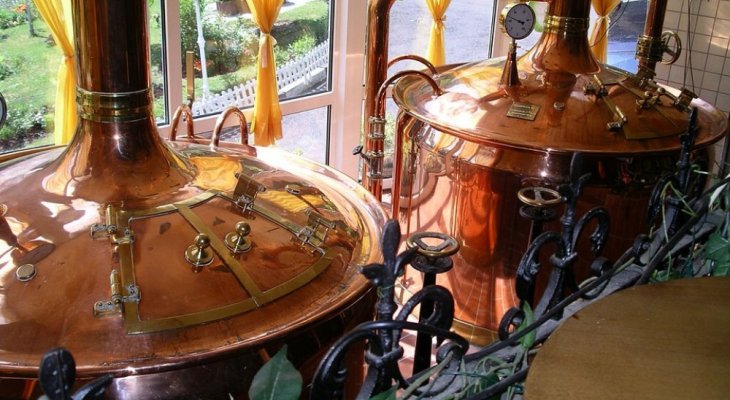How Long Can I Leave My Beer In The Fermenter? Quick & Easy Overview

If you are a homebrewer and have been concerned with just letting your beer batch sit in primary or secondary fermentation, this blog post will give you an answer to how long you can let it sit for without any issues.
How Long Can I Leave My Beer in the Fermenter? Among most homebrewing enthusiast it is generally considered ill-advised to leave your beer for more than 4 weeks in primary or secondary fermentation. This 4-week mark is a safety net to make sure your beer doesn’t oxidate and gets ruined, however, there are types of beer you can leave for longer.
Continue reading as I explain what and why might happen if you leave your beer too long in the fermenter, and how to avoid it.
Read Also: 3 Dirt Cheap Fermenter Buckets
So, How Long Can You Leave Your Beer in the Fermenter?
First, it is important to understand that in homebrewing there are generally 2 types of fermentation. These are primary fermentation and secondary fermentation.
Both are generally the same processes but people adapt secondary fermentation as it can give your beer some unique properties, and is in some recipes very vital for the right outcome.
Stick to only primary fermentation if you are scared of ruining your batch.
If you, like myself, don’t like wasting good beer you should probably only use recipes where primary fermentation is needed.
When you use secondary fermentation there are risks involved, as you can easily contaminate your beer if you don’t do it right.
What Happens if I Let my Beer Ferment Too Long?
This question is often asked, and the answer isn’t really set in stone. Many homebrewers have the general rule of thumb that they don’t leave their beer in primary or secondary fermentation longer than 4 weeks each.
The reason for this is that after this time period your yeast is more than likely completely juiced out, and leaving it for too long increases the risk of oxidation, and thereby a bigger risk of ruining your entire batch.
Some beers can’t really ferment too long and may even become better in quality by staying in the fermenter for longer periods of time.
There are certain types of beer that can benefit from staying in the fermenter for longer periods of time. This is usually the case in for example lagers, where their taste and general mouthfeel can get better over time.
Check Out My Blog Post on How Long Homebrewing Generally Takes
Just make sure you understand what your specific beer needs and follow any recipe you might have to make sure you don’t let it sit for too long(or too short).
Type of Fermenter
The 4-week rule I mentioned earlier especially applies if you are using a plastic bucket as your fermenter. It is almost impossible to make plastic containers completely airtight, so leaving your beer for longer periods in plastic containers has a risk of oxidation.
If however, you are using a metal type fermenter, you can usually make them completely airtight. These types of fermenters will allow you to leave your beer for way longer, up to several months or even a year depending on the type of beer.
Good Price/Quality Fermenter
No products found.
There are many options out there -like this one on Amazon-, a great choice in terms of price/quality.
Make sure you understand when the fermentation process is over, before continuing.
When fermenting, for your own sake make it a habit to understand when your fermentation is complete. Generally, it shouldn’t take longer than 2 weeks for the fermentation itself to be done, but some beers require you to let it sit for longer since your yeast can do some “clean up” that can make your beer better.
TIP: If you are uncertain about whether or not your fermentation is complete just remember that leaving it for a little longer compared to opening it too soon is generally better.
Use a hydrometer if you want to make sure your fermentation is complete.
A fool-proof method most homebrewers use is tracking the alcohol content of your beer with a hydrometer (Amazon link). Once your beer reaches the alcohol content it’s supposed to have, your fermentation is probably complete.
As mentioned, however, it may be beneficial to leave your beer for a bit longer, even if the fermentation is complete, as it can condition your beer in a beneficial way, which may give you a better tasting beer in the end.
Popular Hydrometer
- Accurate Brewing Measurements: Get precise specific gravity, alcohol, and Brix levels with this triple scale hydrometer alcohol test...
- Break-Resistant Test Jar: This brew hydrometer kit includes a plastic test jar, offering a safer, more durable alternative to glass,...
- Easy to Read Scale: The specific gravity hydrometer has clear, detailed markings ranging from 0.99 to 1.17 for specific gravity, 0 to...
Last update on 2026-02-28 / Affiliate links / Images from Amazon Product Advertising API
Do you need a hydrometer? This one is one of the best sellers on Amazon, but there are plenty of great options to choose from.
Yeast Self-digestion

Autolysis of “self-digestion” is a phenomenon that can happen to your yeast if you leave it for too long. What happens is that once your yeast has consumed most if not all of your sugar, it can actually start consuming its own cells.
If this happens your batch is likely spoiled, but if you don’t leave your batch for too long in the primary, this shouldn’t happen.
So in conclusion, yes you can ferment beer for too long. Beers are different, and some require you to ferment for longer than others.
Make sure you understand the type of beer you are crafting and follow any special time frames that might follow whatever recipe you are using.
If you are a generally busy person, try to time your primary fermentation so that in 2-4 weeks whatever fits, you actually have time to continue the brewing process, so you don’t risk spoiling your beer by leaving it in the fermenter for too long
Can I Bottle My Beer After One Week?
If you are the more impatient type of beer brewer, you may be wondering if it’s possible to bottle a beer after just a week of fermentation.
There is good news because in some cases, where your fermentation has been really successful and fast, your beer can be ready to bottle after just a week or maybe even less.
Generally, homebrewers will tell you that waiting longer compared to rushing things is the best thing to do.
Make absolutely sure that your fermentation is completed and your beer has reached the alcohol level and final gravity it’s supposed to.
For this, you can use a hydrometer, which can measure these levels and help you get a clear answer to whether or not your fermentation is complete.
Some solid advice most seasoned homebrewers will give you is: give it time. Homebrewing shouldn’t be rushed, you aren’t a large brewery who needs to make a profit.
Homebrewing is about making some nice homemade beer that tastes great and that you can feel good about because you did it yourself!
If you are a beginner, it makes sense wanting to rush your first batch because you simply just wait, but if possible, try to find some patience and wait a bit longer.
If you can wait longer there’s a solid chance your first time tasting your own beer will be a lot better compared to rushing the process.
Bottling doesn’t mean your beer is ready to drink, now its time for even more waiting.
Sorry to be the bearer of bad news, but once you bottle your beer it isn’t actually done yet.
Now is the time for bottle conditioning, which is usually anywhere between 1-3 weeks for rather standard beers.
I would highly advise that you let your beer condition in the bottle for more than a week. Aim for a minimum of 2 weeks to allow your beer to carbonate properly, it will give you a better taste experience in the end.
Read Also: Best Electric Brewing Systems




